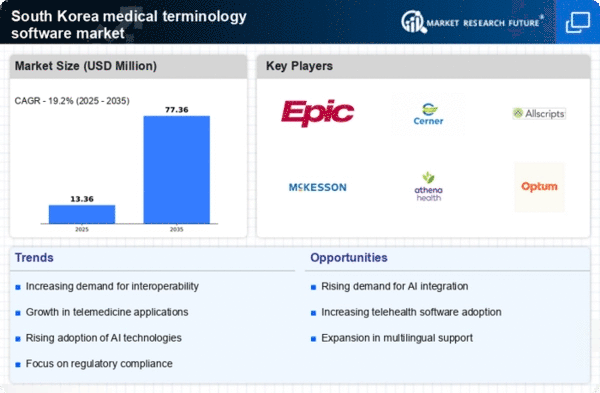The South Korea Medical Terminology Software Market is characterized by a competitive landscape that is continually evolving due to advancements in technology and the growing demand for efficient healthcare solutions. The market plays a critical role in the healthcare industry by facilitating seamless communication between various health information systems, thus improving the accuracy and efficiency of patient care. The competitive insights reveal a mix of established companies and emerging players that are actively working to enhance their offerings through innovative features and customer-centric services.
Key features of medical terminology software, such as interoperability, ease of use, and compliance with healthcare regulations, enable organizations within the South Korean healthcare ecosystem to improve operational efficiency while addressing the linguistic and technical complexities of health data management.
Siemens Healthineers demonstrates a strong presence in the South Korea Medical Terminology Software Market, focusing on integrating its advanced imaging and diagnostic solutions with powerful healthcare IT services. The company leverages its substantial resources and expertise to develop software solutions that enhance clinical workflows and improve patient outcomes. One of Siemens Healthineers' significant strengths is its commitment to innovation and the strategic use of artificial intelligence to streamline medical data processing. Furthermore, the company's well-established relationships with local healthcare providers and institutions allow it to offer customized solutions that meet the specific needs of the South Korean medical community.
This localized approach enables Siemens Healthineers to maintain a competitive edge, as they adapt their offerings to align with the unique challenges faced by healthcare professionals in the region.
Philips Healthcare also holds a prominent position within the South Korea Medical Terminology Software Market, providing comprehensive solutions that cater to the needs of healthcare providers across the country. The company's key products include advanced medical imaging software and integrated health informatics tools designed to facilitate effective data exchange and improve clinical decision-making. With a focus on developing user-friendly interfaces and promoting interoperability, Philips Healthcare ensures that its software solutions seamlessly integrate with existing healthcare systems. The company has made strategic investments in research and development to enhance its service offerings while acquiring local firms to bolster its market presence.
The strength of Philips Healthcare lies in its ability to deliver tailored solutions that not only enhance operational efficiency in medical practices but also improve the overall patient experience through accurate, timely diagnosis and treatment.











